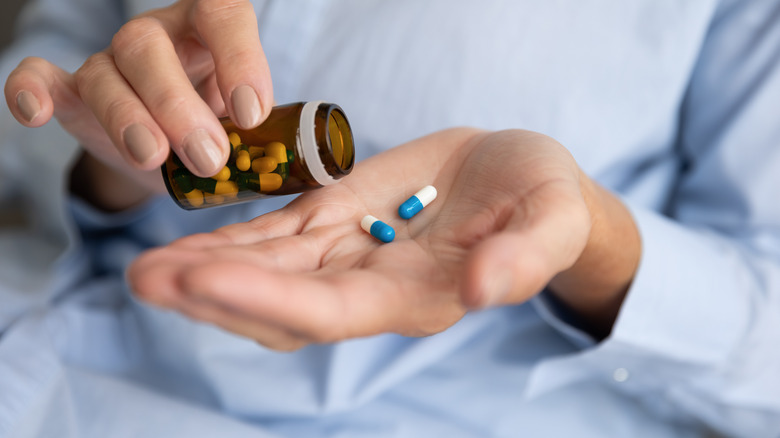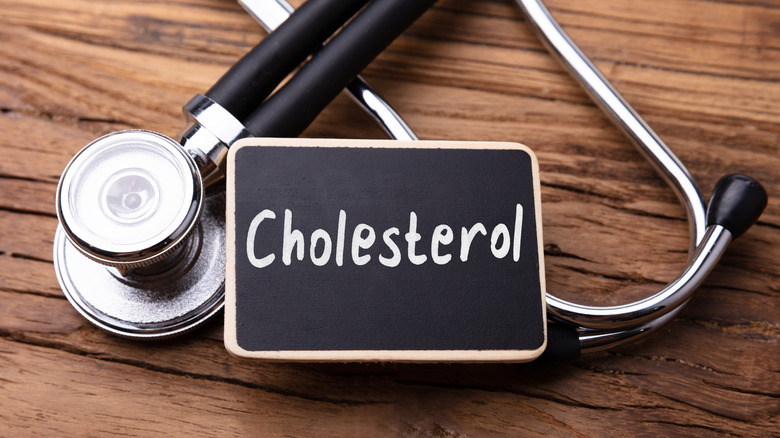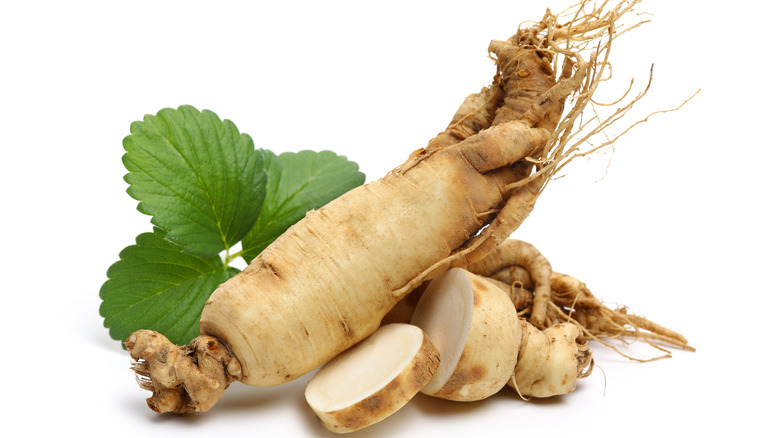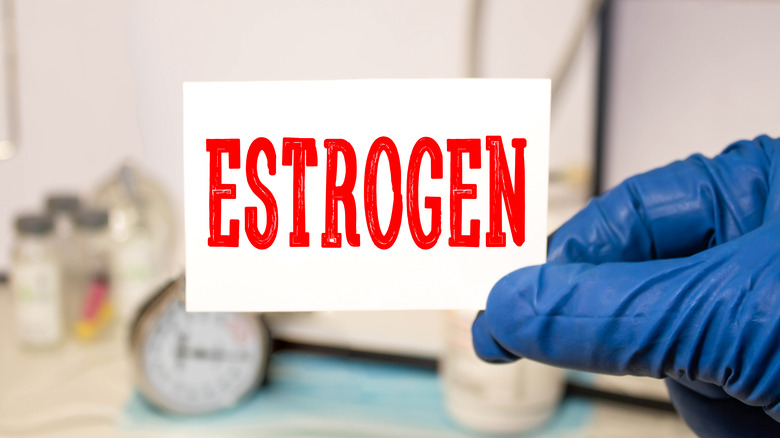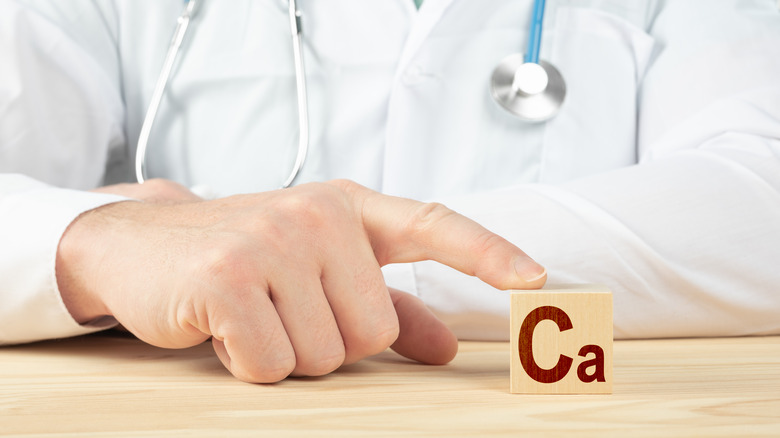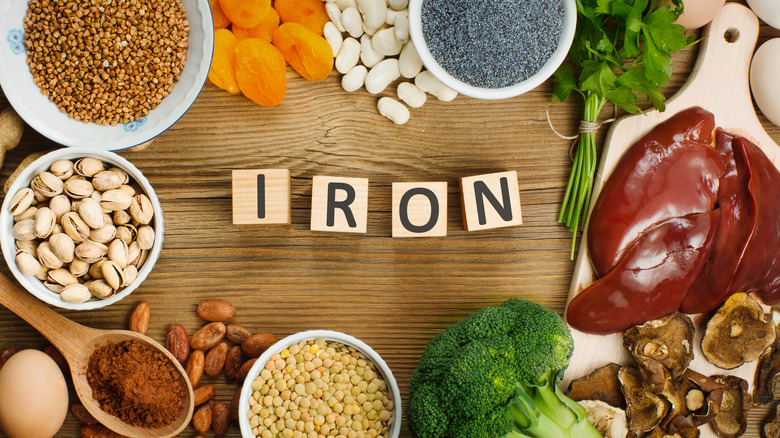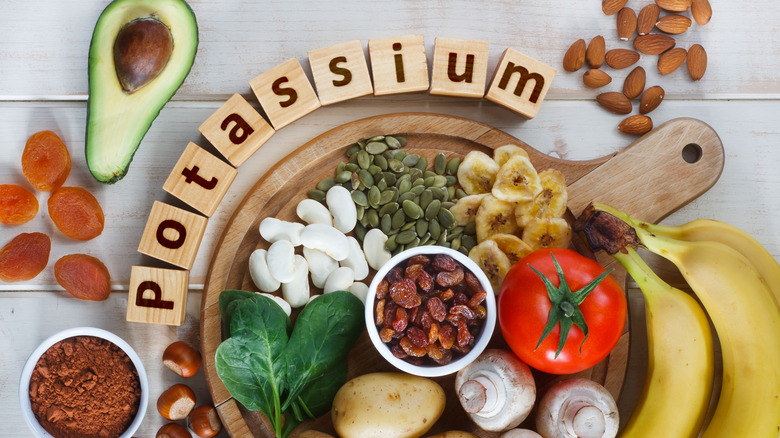Medications And Supplements You Shouldn't Be Taking Together
In some ways, human beings are like walking chemistry experiments. We're a delicate balance of neurotransmitters, hormones, and other chemicals, any one of which can significantly impact our health if they are off even by a small amount. So, it's understandable to have a regular vitamin supplement regime to try to keep your body's chemistry on track. However, combining some supplements with certain medications can be a recipe for health problems.
"Some dietary supplements may increase the effect of your medication, and other dietary supplements may decrease it," says Robert Mozersky, a medical officer at the Food and Drug Administration (FDA). And the converse can also be true, where a medication may either raise or lower the level of nutrients in your body, which can lead to chain reactions and additional health problems. And this is where we come back to the idea that humans are walking chemistry experiments. We're complex individuals, meaning we're not all going to react the exact same way to the same drugs and supplements. However, being aware of possible medicine-supplement interactions will make you better prepared to speak with your healthcare professional about your needs. Yes, there still may be some trial and error to figure out the best combination of medication and daily vitamins. However, that doesn't mean you can't avoid some problems before they begin, or catch some problems before they escalate.
Ginkgo Biloba and antidepressants
If you have anxiety, your doctor might recommend taking a type of antidepressant called a selective serotonin reuptake inhibitor (SSRI), which raises how much serotonin is in your brain (via MedicineNet). However, family or friends may encourage you to also take the supplement ginkgo biloba, since it's marketed as a way to not only improve memory but also to treat anxiety (WebMD). Since ginkgo biloba isn't medication, it would seem like a safe way to reinforce the benefits of your SSRI. Unfortunately, not only is the opposite true, but taking both could be very dangerous.
As WebMD warns, antidepressants can raise your risk of experiencing a seizure, and that potential risk only goes up if you take ginkgo biloba as well. In addition, St. Luke's Hospital's website explains that the combination of SSRIs and ginkgo biloba can lead to serotonin syndrome. Symptoms of this serious medical condition include an accelerated pulse, an inability to sit still, and hyperthermia.
Besides SSRIs, ginkgo biloba can also interact with another type of antidepressant called monoamine oxidase inhibitors, or MAOIs (via St. Luke's Hospital). While MAOIs also help to increase serotonin levels (as well as other chemicals in the brain), they do so by preventing these chemicals from being broken down (via MedicineNet). However, ginkgo biloba can increase both the positive impact of this drug, as well as it's negative effects. Possible side effects from MAOIs include insomnia, constipation, and diarrhea (via Medical News Today).
Vitamin C and the antipsychotic drug fluphenazine
Unless you've been living under a rock, you've heard of ascorbic acid, although you may know it by the name vitamin C (via Verywell Health). From helping your bones, teeth, and even cartilage mend to keeping your cells strong, this is a powerhouse antioxidant that's crucial for good health. But that doesn't mean vitamin C can't cause issues when it comes to certain drugs.
To understand how vitamin C can interact with different medications, it's important to remember one thing: Your body doesn't hold onto every bit of a drug. Some of it will be not be absorbed into your bloodstream. However, as Healthline explains, vitamin C can raise the acidity level in your urine, which means you may excrete either more or less of a particular medicine than you normally would. Case in point, fluphenazine, an antipsychotic drug that may be released in greater amounts from your body if you take it with vitamin C (via Verywell Health). This can make the fluphenazine less effective.
So, should you stop taking vitamin C supplements and reduce it from your diet if you take fluphenazine? Not, necessarily. However, you should let your healthcare professional know what supplements you're taking, how much you're taking, and when you're taking them. And even if you're not taking supplements, you should still let them know if a medication you're taking is not working or not making a strong enough impact on your condition.
Vitamin A and the cholesterol drug cholestyramine
If you are worried about your vision, then you're probably already well acquainted with vitamin A. After all, if you don't get enough of this key nutrient, you could wind up with issues seeing at night, as well as general problems with your eyes' overall health (via WebMD). But taking vitamin A supplements with a medication used to treat cholesterol might be counterproductive.
According to WebMD, the drug cholestyramine can be part of a regime to help keep cholesterol from getting too high. The way it works is it reduces how much bile is in your body, forcing your liver to use existing cholesterol to create more bile. However, cholestyramine may prevent your body from properly processing vitamin A, which can lead to significant health issues (via Healthline and WebMD). Since vitamin A is so crucial to your eyes, cholestyramine interacting with vitamin A supplements may not only be bad for your vision but also lead to irreversible eye damage (via WebMD). For this reason, the Prescribers' Digital Reference recommends putting as much time as possible between taking your vitamin A supplement and cholestyramine.
St. John's wort and the migraine medicine triptans
If you've ever had a migraine, then you know how vital medications can be to stop an attack. Besides pain that can reach debilitating levels, migraines usually come with a host of other symptoms, including sounds being amplified and light being uncomfortably bright, and stomach problems like nausea (via National Headache Foundation). But a word of caution: If you are a migraineur, you might want to avoid taking St. John's wort.
While this popular supplement is used to help with depression, it can interact with a specific class of medications called triptans (via Healthline and National Headache Foundation). To understand why, however, we need to look at how triptans work. In a nutshell, triptans stimulate the chemical serotonin, which has two major effects that can help stop a migraine: 1) it causes your blood vessels to narrow, reducing blood flow, and 2) reduces inflammation in the body. But the Mayo Clinic warns that you should not take St. John's wort with triptans because it could lead to the serotonin levels in your body spiking too high. But wouldn't more serotonin mean fewer migraines? Unfortunately, it's not so cut-and-dry. According to Medical News Today, too much of this chemical leads to a condition called serotonin syndrome, which can cause a fast pulse, nausea and vomiting, perspiration, hallucinations, and anxiety, as well as extreme disorientation, stiffness in your muscles, and hyperthermia.
Ginseng and the blood thinner warfarin
Sometimes on paper a supplement and a medication look like they'd work together hand in hand. Ginseng, for example, can have an anti-clotting effect on the body (via University of Chicago Medicine). And warfarin is a widely used blood thinner in the United States, often prescribed to reduce the chances of blood clots forming and causing medical issues. So, putting an anti-clotting supplement together with a blood thinner should is a no-brainer, right?
As logical as that theory sounds, research from the University of Chicago Medicine tells a very different story. As the school's website explains, a study involving 20 individuals found that ginseng reduced warfarin's ability to prevent blood clotting. Although the team who conducted the study have not found a conclusive reason why this occurred, they theorize that ginseng could have an impact on certain enzymes. The results might be that these enzymes break down more of the warfarin than they normally would, and in the process they reduce the medication's overall potency, something that the study's author, Dr. Chun-Su Yuan, warns can be dangerous. "Warfarin has a narrow therapeutic index, which means precise dosing is crucial," Dr. Yuan states on the University of Chicago Medicine's website. He adds, "... a substance, such as ginseng, that alters warfarin's effects, even slightly, can have significant consequences."
Echinacea and immunosuppressants
It often feels like winter is linked with this next supplement — and for good reason. Echinacea is often taken to strengthen one's immune system and hopefully ward off colds and flus, or at least lessen symptoms like fever and coughing (via Mount Sinai). But there are times a stronger immune system can actually work against an individual's best health interests.
If you're scratching your head after reading that last sentence, keep in mind that not everything your immune system might attack is a foreign invader. Case in point, when a person gets an organ transplant, the body doesn't know that this new organ is crucial for the body's survival. It just detects something new and potentially dangerous. This is why a patient who has had a transplant takes immunosuppressants, which, as the name suggests, suppresses the immune system so it won't attack the new organ (via Mount Sinai). Unfortunately, since echinacea does just the opposite, it takes away from an immunosuppressant's ability to protect the transplanted organ.
Beyond immunosuppressant drugs, Mount Sinai's website recommends contacting your healthcare professional about possible interactions with echinacea if you are on any kind of prescription drug. Specific types of drugs they warn against include the antifungal econazole and anesthesia medications. In addition, they caution that echinacea can interact with caffeine, causing it to stay in your body longer than normal. So, you might not want to take your supplements with that morning cup o' joe.
Dong Quai and hormone medications
Also known as "female ginseng," dong quai is commonly used in Traditional Chinese Medicine (TCM) to help women with health problems connected to their reproductive system (via Mount Sinai). Now, in the interest of giving a full picture, there is a lack of scientific studies to support dong quai's impact on issues like PMS, an irregular period, or the symptoms of menopause. With that said, practitioners of TCM commonly recommend this supplement for women experiencing painful menstruations. And it's dong quai's potential impact on the female body that might lead to a drug interaction.
As Mount Sinai's website explains, a woman taking a hormone medication such as birth control pills, or hormone medications like estrogen or progesterone, might want to think twice about taking dong quai. This is because there are concerns that it could have a similar impact on a woman's body as estrogen, though more research is needed to confirm this potential interaction. If it is, in fact, the case, then a hormone medication on top of dong quai could give someone too high a dose of estrogen, which can cause unpleasant symptoms including bloating, mood swings or anxiety attacks, fatigue, weight gain, and hair loss, among others (via Healthline).
In addition to hormone medications, the Mount Sinai website says dong quai can also increase your chances of bleeding if you take it with a blood thinner. Plus, combining it with another supplement on this list, St. John's wort, might lead to a greater sensitivity to the sun's rays.
Calcium and tetracycline antibiotics
Although most people associate calcium with having strong bones, this nutrient is also important for your muscles, nerves, and cells (via MedicineNet). So, it's understandable to want to keep the calcium levels in your body nice and high, especially since your body will leach the calcium from your bones if you don't. Yes, you read that right. Not taking in enough calcium can lead to health issues like rickets and osteoporosis. With that said, high calcium and the drug tetracycline are not a good combination.
As MedicineNet explains, tetracycline is an antibiotic used to treat a wide variety of bacterial health issues like Neisseria gonorrhoeae and Streptococcus pneumoniae. But like all medications, you body needs to properly absorb the tetracycline in order to reap the maximum benefits from the drug. And as American Bone Health notes, those high levels of calcium that may protect your bones can also affect how your body absorbs tetracycline.
To avoid a possible drug-supplement interaction, American Bone Health recommends waiting at least two hours after taking tetracycline before taking a calcium supplement. In addition, they advise to hold off eating or drinking anything containing calcium until the antibiotic has been in your system for two hours or more. To be safe, however, you may want to wait a full four hours before taking a calcium supplement or drinking a nice tall glass of milk.
Zinc and the diuretic amiloride
If you picked any single cell out of your body and looked at all it's components, you'd find at least a little zinc (via Mount Sinai). That's because this mineral is essential for a number of different bodily functions, effecting how your body uses insulin, how efficiently your body recovers from wounds, and even how well your body fights off foreign invaders like harmful bacteria and viruses. But there is a downside to this ultra-important mineral, and it has to do with amiloride and copper.
First, let's talk about amiloride. This diuretic or water pill is prescribed to help patients avoid retaining excess amounts of water (via Mount Sinai). It accomplishes this by increasing how often someone urinates (via Mayo Clinic). Sounds simple enough, but amiloride can also spike how much zinc is flowing through your bloodstream. The result? Unfortunately, as your zinc levels go up, your copper levels go down since zinc interferes with how efficiently your body can absorb copper (per Medical News Today). And that dip in copper can cause significant health problems like osteoporosis, issues with your thyroid, and anemia. Some individuals may also experience their body's temperature falling below normal and their skin losing its pigmentation. So, to make sure all your nutrients stay at their proper levels, speak with your healthcare professional.
Iron and the Parkinson's disease medicine levodopa
The Parkinson's Foundation's website describes levodopa as "... the most important first-line drug for the management of Parkinson's." Often combined with a second medication called carbidopa, levodopa is changed by the body into the chemical dopamine, which is crucial for all types of body movements. Everything from using your fingers to type out a text to pumping your legs during a morning run are all made possible in large part because of the dopamine in your body. So, levodopa is a crucial treatment for Parkinson's, which can cause tremors and problems with balance (via Parkinson's Foundation). But unfortunately, iron can negatively impact how someone's body uses this vital drug.
Now, before we really explore this drug interaction, let's be clear about one thing: Iron is very important to good health. As WebMD explains, your body needs this mineral in your blood to make sure all parts of your body are receiving oxygen. But taking both iron and levodopa can lead to less of the levodopa being absorbed by the body, which means less of the drug is converted into dopamine (via WebMD and Parkinson's Foundation). And this could mean a Parkinson's patient has less control over their movements despite religiously taking their medication. If you or someone you know has Parkinson's and is finding levodopa is not working as well as you expected, you may want to ask your doctor about a blood test to check iron levels. And one final thing to remember: Multivitamins sometimes contain iron, so make sure to read the label.
Schisandra and the transplant medication tacrolimus
The red berries of the schisandra plant may be small, but they are potent and are used to treat a wide variety of ailments. According to Verywell Health, Traditional Chinese Medicine (TCM) uses schisandra to treat health problems like the flu, asthma, premenstrual syndrome, insulin resistance, and insomnia. However, if you've had a liver transplant, schisandra may not be a good addition to your wellness regimen.
Although your stomach breaks down foods and certain medications, some drugs are processed by your liver (via Verywell Health). This includes tacrolimus, which is prescribed to liver transplant patients because it helps to keep your immune system from rejecting the new liver (via Medline Plus). Remember, when a person gets a new organ, their body initially will see it as a foreign object and possible invader. However, your liver also breaks down schisandra, which means while your body is busy breaking down schisandra, you might wind up with higher levels of tacrolimus than you normally would (via Memorial Sloan Kettering Center). And as Verywell Health explains, higher levels of medications like tacrolimus can raise the chances of someone experiencing side effects. These can include dizzy spells, heartburn, and sleeping issues, as well as increases in weight, an accelerated pulse, hives, breathing issues, seizures, and coma (via Medline Plus).
Magnesium and medications for osteoporosis
To say you need magnesium is an understatement. From helping to make sure your body doesn't have too much or too little of key vitamins and minerals like vitamin D, calcium, and zinc, to being crucial for your kidneys, heart, and muscles to function properly, it's safe to say that this nutrient is crucial for your overall good health (via Mount Sinai). And yet, there's a double-edged sword when it comes to how magnesium affects medications to treat osteoporosis.
According to the Mount Sinai website, magnesium a key nutrient your body needs to keep your bones healthy. So, taking magnesium supplements and making sure you consume enough of it might reduce your chances of one day being diagnosed with osteoporosis. However, if you are taking drugs for osteoporosis like alendronate and tiludronate on top of magnesium supplements, then your body might not absorb these medications correctly. And more bad news: Even the magnesium in some antacids can interfere with how your body absorbs its osteoporosis medicines.
Before you throw up your hands in frustration, don't worry. There is a simple solution to this possible supplement-drug interaction. Simply wait and hour or two after you take your osteoporosis medication before taking your magnesium supplement or antacid (via Mount Sinai). And don't hesitate to write down the times you take medications and supplements. This is not only a good way to keep track of everything, but also useful information for your healthcare professional.
Potassium and blood pressure medications
The saying "too much of a good thing" can definitely apply to potassium. As WebMD notes, potassium is an important nutrient for the body that assists with basic functions like your muscles contracting. But it's strength can also become your weakness if you are being treated for high blood pressure. According to the MedicineNet, two types of medication prescribed for high blood pressure are angiotensin converting enzyme inhibitors (ACE inhibitors) and angiotensin-receptor blockers (ARBs). Both of these types of drugs affect a substance in your body called angiotensin, which can make your blood vessels narrower. Remember, the more constricted your blood vessels are, the harder your heart has to work to pump blood through them, which can raise your blood pressure. So, by stopping angiotensin from binding to the blood vessels, these drugs help keep those pathways relaxed and open. But here's the rub. While potassium is also recommended for high blood pressure (per WebMD), taking it with either of these types of blood pressure medications can have serious consequences.
As WebMD explains, both ACE inhibitors and ARBs can interact with potassium supplements, causing your potassium levels to spike to potentially dangerous levels. How dangerous? Well, keep in mind that potassium helps your muscles contract, and your heart is a muscle. So, if you have excess potassium, you could have a heart attack (American Kidney Fund). This is why it's crucial to talk with your doctor and have a blood test to measure your blood's potassium levels if you're trying to manage high blood pressure.
Garlic and HIV/AIDS medications
As if turns out, Dracula isn't the only one who may need to avoid garlic. Yes, this supplement (not to mention potent cooking herb) can help reduce your risk of developing Alzheimer's disease and cancer, as well as having a stroke or a heart attack (via Mount Sinai). It's also been shown to be beneficial for your immune system and blood pressure. But despite all of its potential health benefits, garlic can be very bad for someone with HIV or AIDS.
As Medical News Today explains, the HIV virus targets specific cells in one's immune system, taking them over and "reprogramming" them to help make more HIV viruses instead of keeping the immune system operating normally. A major enzyme that helps HIV with this replication process is called protease. This is why HIV/AIDS drugs that block this enzyme and help keep HIV from replicating are called protease inhibitors. But unfortunately, garlic can drop the levels of these medications in the body — specifically, garlic may interact with the protease inhibitors amprenavir, ritonavir, indinavir, saquinavir, fosamprenavir, and nelfinavir. The result is a less effective defense against HIV (via Mount Sinai). But even if you are on a different type of treatment for HIV or AIDS, it's important to work with your medical team to closely monitor your condition.

